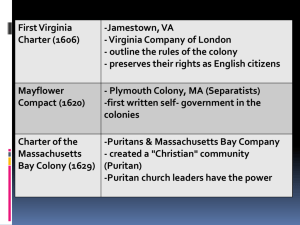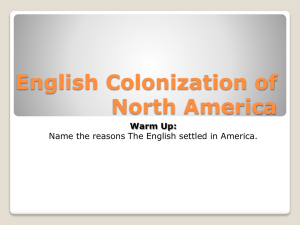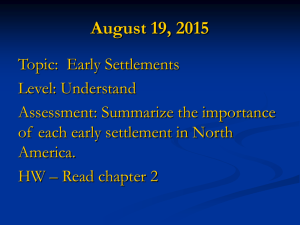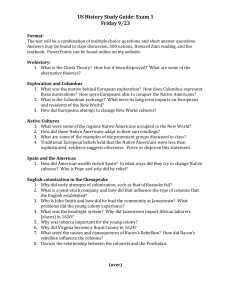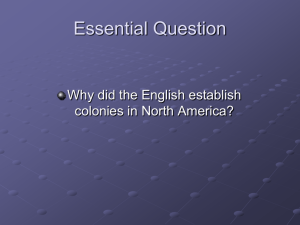English Colonization of North America
advertisement
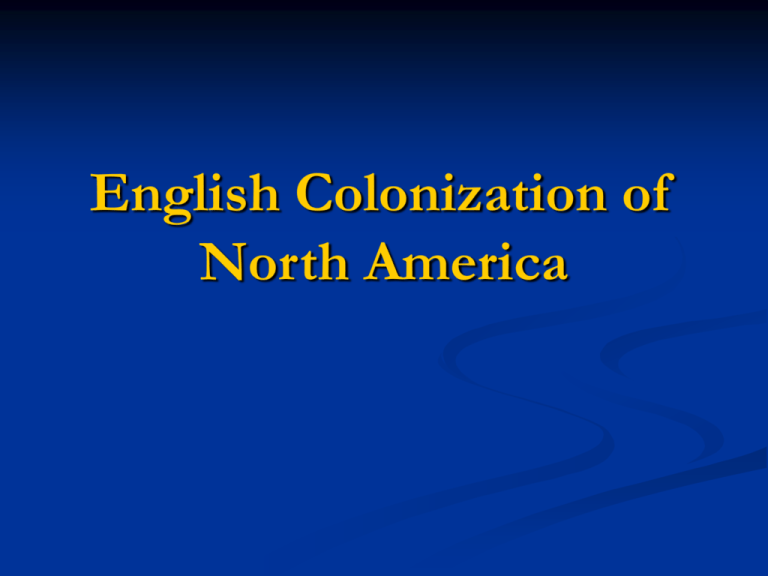
English Colonization of North America Review - What are Push-Pull Factors? Push Land scarcity Religious or Political Persecution Revolution Poverty Weather Pull Freedom (religious and political) New life Jobs Land Resources Reasons for Colonization Financial $$$ Religion Expand the British Empire Start a new life First Unsuccessful English Colony Roanoke Island in 1587 The “Lost Colony” What Happened to the Colony? Slaughtered by Natives Absorbed by the Natives Weather ?? First Successful English Colony Jamestown 1607 Reason for Colony was financial $$ Joint Stock Company Africans introduced in 1619 Hardships of Jamestown Too many gentlemen No gold Starvation – “Starving Time” Vocabulary Joint Stock Company – investors pool money to pay for colonization in hopes of making money Headright System – 50 acres of land colonists could obtain (offered by the VA co) House of Burgessess – legislative assembly Major Contributions of Jamestown Cash Crop ---Tobacco - John Rolfe Introduction of Indentured Servants Indentured Servants: Poor Europeans that wanted to come to the colonies, but couldn’t afford to come. Passage was paid by colonial land owners in return for manual labor. A contract was generally 3 – 5 years. Colony at Plymouth The Pilgrims – Separatists (from Catholic Church and Church of England) Reason for Colony was Religion Hardships were Weather and Starvation Major Contribution is the Mayflower Compact – the first form of American democracy. Self-Government and Majority Rule William Bradford born in England Plymouth’s 1st governor Puritans – Massachusetts Bay Colony group that wanted to “purify” the Church of England many moved to America during the Great Migration had strict laws that centered on religion John Winthrop Puritan “City upon a hill” led the 1st group of Puritans to Massachusetts in 1630 1st governor of Massachusetts Roger Williams Puritan minister disagreed with Puritan leaders because he believed in religious freedom it was wrong to take land from the Native Americans banished from Massachusetts by Puritan leaders founded the colony of Rhode Island Jamestown Plymouth Massachusetts Bay - 1630 1606 1620 People Reasons for Moving Hardships / How it finally worked Leadership and Government Jamestown Plymouth Massachusetts Bay - 1630 1606 1620 People John Smith Pocahontas John Rolfe William Bradford John Winthrop Anne Hutchinson (RI) Roger Williams (RI) Reasons for Moving Joint-Stock Company Profit Pilgrims Separatists Religion Puritans – Profit and religion “City Upon a Hill” Hardships / How it finally worked Malaria / Dystentery Hunger / Cold / / “Starving Time” Illness Tobacco Corn / Good relations with Natives, Furs, Fish Salem Witch Trials Disagreements with Leadership “Great Migration” Leadership and Government John Smith House of Burgesses Church and Government Elected Council John Winthrop Williams and Hutchinson Mayflower Compact William Bradford New Amsterdam most important Dutch settlement in what is now the U.S. located on Manhattan Island renamed New York City when taken over by the English in 1664 William Penn wealthy English Quaker founded the colony of Pennsylvania in 1682 13 English Colonies Split into 3 Regions New England Middle Southern Map Activity Label the 13 colonies. Color the middle colonies one color, New England colonies a different color, and southern colonies another color. One the back of the page, create a chart. The Thirteen Colonies New England Massachusetts New Hampshire Connecticut Rhode Island Middle New York Pennsylvania New Jersey Delaware Southern Maryland Virginia North Carolina South Carolina Georgia Colonial Regions NE Middle Southern Climate Resources Social Class Long winter, short growing season Short winters Rocky soil, good fishing grounds Larger farms, cash crops of grain Plantation, limited cash crops Middle class Warm, yearround growing season Poor, middle class Rich noble families, poor, indentured servants French & Indian War 1754-1763 French and Indian allies fight Britain for control of North America. Effects of the War British empire grows Colonists had to pay for the war Proclamation of 1763 said settlers could not go west of the Appalachian Mountains see page 94 Notebook Citizenship Question Ch 1 Sec 1 Notes Vocabulary Map Important Peeps Exploration Notes Colonization Notes Review Planner

